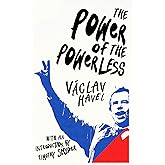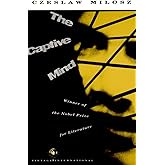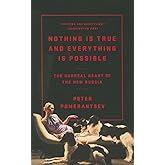
Download the free Kindle app and start reading Kindle books instantly on your smartphone, tablet, or computer - no Kindle device required.
Read instantly on your browser with Kindle for Web.
Using your mobile phone camera - scan the code below and download the Kindle app.

Politics and the English Language (Penguin Modern Classics) Paperback – International Edition, January 15, 2013
Purchase options and add-ons
- Print length48 pages
- LanguageEnglish
- PublisherPenguin Classic
- Publication dateJanuary 15, 2013
- Dimensions4.3 x 0.08 x 7.2 inches
- ISBN-100141393068
- ISBN-13978-0141393063
Book recommendations, author interviews, editors' picks, and more. Read it now
Frequently bought together

Customers who viewed this item also viewed
 The Power of the PowerlessMass Market Paperback
The Power of the PowerlessMass Market Paperback
Editorial Reviews
About the Author
Product details
- Publisher : Penguin Classic (January 15, 2013)
- Language : English
- Paperback : 48 pages
- ISBN-10 : 0141393068
- ISBN-13 : 978-0141393063
- Item Weight : 0.847 ounces
- Dimensions : 4.3 x 0.08 x 7.2 inches
- Best Sellers Rank: #897,047 in Books (See Top 100 in Books)
- #3,012 in Essays (Books)
- Customer Reviews:
About the author

George Orwell is one of England's most famous writers and social commentators. Among his works are the classic political satire Animal Farm and the dystopian nightmare vision Nineteen Eighty-Four. Orwell was also a prolific essayist, and it is for these works that he was perhaps best known during his lifetime. They include Why I Write and Politics and the English Language. His writing is at once insightful, poignant and entertaining, and continues to be read widely all over the world.
Eric Arthur Blair (George Orwell) was born in 1903 in India, where his father worked for the Civil Service. The family moved to England in 1907 and in 1917 Orwell entered Eton, where he contributed regularly to the various college magazines. From 1922 to 1927 he served with the Indian Imperial Police in Burma, an experience that inspired his first novel, Burmese Days (1934). Several years of poverty followed. He lived in Paris for two years before returning to England, where he worked successively as a private tutor, schoolteacher and bookshop assistant, and contributed reviews and articles to a number of periodicals. Down and Out in Paris and London was published in 1933. In 1936 he was commissioned by Victor Gollancz to visit areas of mass unemployment in Lancashire and Yorkshire, and The Road to Wigan Pier (1937) is a powerful description of the poverty he saw there.
At the end of 1936 Orwell went to Spain to fight for the Republicans and was wounded. Homage to Catalonia is his account of the civil war. He was admitted to a sanatorium in 1938 and from then on was never fully fit. He spent six months in Morocco and there wrote Coming Up for Air. During the Second World War he served in the Home Guard and worked for the BBC Eastern Service from 1941 to 1943. As literary editor of the Tribune he contributed a regular page of political and literary commentary, and he also wrote for the Observer and later for the Manchester Evening News. His unique political allegory, Animal Farm was published in 1945, and it was this novel, together with Nineteen Eighty-Four (1949), which brought him world-wide fame.
It was around this time that Orwell's unique political allegory Animal Farm (1945) was published. The novel is recognised as a classic of modern political satire and is simultaneously an engaging story and convincing allegory. It was this novel, together with Nineteen Eighty-Four (1949), which finally brought him world-wide fame. Nineteen Eighty-Four's ominous depiction of a repressive, totalitarian regime shocked contemporary readers, but ensures that the book remains perhaps the preeminent dystopian novel of modern literature.
Orwell's fiercely moral writing has consistently struck a chord with each passing generation. The intense honesty and insight of his essays and non-fiction made Orwell one of the foremost social commentators of his age. Added to this, his ability to construct elaborately imaginative fictional worlds, which he imbued with this acute sense of morality, has undoubtedly assured his contemporary and future relevance.
George Orwell died in London in January 1950.
Customer reviews
Customer Reviews, including Product Star Ratings help customers to learn more about the product and decide whether it is the right product for them.
To calculate the overall star rating and percentage breakdown by star, we don’t use a simple average. Instead, our system considers things like how recent a review is and if the reviewer bought the item on Amazon. It also analyzed reviews to verify trustworthiness.
Learn more how customers reviews work on AmazonCustomers say
Customers find the book's writing insightful and consider it a must-read. Moreover, they appreciate its relevance to current events, with one customer noting it's particularly appropriate for today's political climate. However, the book receives mixed feedback about its length, with several customers describing it as very short. Additionally, the punctuation receives criticism for containing many typos and words running together.
AI-generated from the text of customer reviews
Select to learn more
Customers praise the writing quality of the book, describing it as insightful and concise, with one customer noting it as their favorite book on craft and language usage.
"...If you're interfered in writing, this is a must read." Read more
"This book is a must read, especially in these times...genius!!" Read more
"...of the pamphlet (that is what it is, NOT a Book) is very well done, well phrased, typeset, excellent punctuation, etc...." Read more
"...It is a a large type version, haphazardly edited and printed, leaving many dangling sentences to be completed on the next line--see picture...." Read more
Customers find the book relevant to current events, with one customer noting it provides historical context and another mentioning its applicability to today's political climate.
"Very insightful with many observations from the past just as applicable in todays world...." Read more
"Very insightful. But we must be reminded of the classical education included Latin, Without that insight Mr. Orwell might coms across a bit rigid...." Read more
"Great reference but very skimpy!" Read more
"...Today I don't think they'd let him publish this - not politically correct!" Read more
Customers have mixed opinions about the book's length, with some finding it very short, while one customer notes it's not much bigger than a remote control.
"Very short so definitely worth it to read, especially if you want to understand how twisted institutions have gotten with word salads that are..." Read more
"...It is a a large type version, haphazardly edited and printed, leaving many dangling sentences to be completed on the next line--see picture...." Read more
"...Those of us who write can take a lesson from his brevity, simplicity, and honesty. What a writer." Read more
"Short but well explained. It lets you rethink how you think and write." Read more
Customers criticize the book's punctuation, noting numerous typos, words running together, and inconsistent spacing between words and lines.
"...a large type version, haphazardly edited and printed, leaving many dangling sentences to be completed on the next line--see picture...." Read more
"...It was rift with gaps, improper punctuation, poor transition from..." Read more
"...looks as if it was reproduced from a photocopy, with a plethora of typos and missing spaces...." Read more
"...No! They blend seamlessly with his text making it extremely frustrating to determine where examples end and Orwell's analysis begins. Horrible!..." Read more
Reviews with images
Poorly printed
Top reviews from the United States
There was a problem filtering reviews. Please reload the page.
- Reviewed in the United States on January 17, 2025It's pure joy to discover the writing process Orwell demonstrates through his essays. If you're interfered in writing, this is a must read.
- Reviewed in the United States on December 2, 2024The ending that was terrible for me was the unnecessary image of an elephant dying because the story teller had to go thru with what they set into plan.
- Reviewed in the United States on April 23, 2021I loved what George Orwell had to say. However, this paperback version of his essay is so poorly printed as to be distracting. It is a a large type version, haphazardly edited and printed, leaving many dangling sentences to be completed on the next line--see picture. I recommend the essay but cannot recommend this printing of it.
 4.0 out of 5 starsI loved what George Orwell had to say. However, this paperback version of his essay is so poorly printed as to be distracting. It is a a large type version, haphazardly edited and printed, leaving many dangling sentences to be completed on the next line--see picture. I recommend the essay but cannot recommend this printing of it.
4.0 out of 5 starsI loved what George Orwell had to say. However, this paperback version of his essay is so poorly printed as to be distracting. It is a a large type version, haphazardly edited and printed, leaving many dangling sentences to be completed on the next line--see picture. I recommend the essay but cannot recommend this printing of it.Poorly printed
Reviewed in the United States on April 23, 2021
Images in this review
- Reviewed in the United States on October 23, 2024This book is a must read, especially in these times...genius!!
- Reviewed in the United States on January 29, 2023Very insightful with many observations from the past just as applicable in todays world. The references to the government’s use of propaganda are especially poignant. Anyone concerned about the rise of totalitarianism in the 21st century would gain a good deal of perspective on the cause and danger we face.
- Reviewed in the United States on August 12, 2021WHAT a convoluted ripoff. This ‘book’, if I can call it that, is 30 pages of general claptrap, 11 pages of selected biographical information, 13 pages of references, and 5 blank pages plus three photos of the author (which I could have gotten off the Wikipedia).
The ‘meat’ or should I say the rotted hay portion of the book was a very poor attempt at typesetting of his work. It was rift with gaps, improper punctuation, poor transition from
one idea to another, and just as difficult to follow as the prose he was trying to criticizing.
The reason I criticize this work is because the bio part of the pamphlet (that is what it is, NOT a Book) is very well done, well phrased, typeset, excellent punctuation, etc. Why not the heart of the subject matter?
All in all, don’t wast your time on it. A thousand monkeys banging away on a thousand typewriters can hammer this tripe out in about a day.
Darrow...for the Prosecution
- Reviewed in the United States on March 2, 2024Item arrived in perfect condition, sooner than expected.
- Reviewed in the United States on April 2, 2025The content is great, but the printing/layout is abysmal. You’re better off finding the text online and printing it out. I only bought this because my printer was broken and I needed a copy I could write on, but I have to refer back to the online version to clarify what is actually a heading or subheading, or citation or quotation. Pretty bad.
Top reviews from other countries
 Marco BarcaroloReviewed in Canada on February 28, 2025
Marco BarcaroloReviewed in Canada on February 28, 20255.0 out of 5 stars You have to read it
Very good book
 Michael S WeberReviewed in Germany on January 23, 2020
Michael S WeberReviewed in Germany on January 23, 20205.0 out of 5 stars The Bible for Writers
What more can I say Orwell's very short book is an essential read for any writer. Main point: less is more, and avoid stale, cliched language.
 Jim KABLEReviewed in Australia on April 25, 2017
Jim KABLEReviewed in Australia on April 25, 20175.0 out of 5 stars Eric Blair tells it bluntly - lying involves cliché and long words
Marvellous way for reading the dog-whistling of politicians - and sound advice from "George Orwell" for the writer who wants to be clearly understood - and not sending the intended audience to sleep. The Australian speech-writer and social commentator Don WATSON has similarly but half-a-century and more further on also examined what he calls "weasel words" and "the death sentence" - a worthy successor to the things George/Eric was already identifying for us. And my thanks to WG and her first rate literary blog for alerting me to this essay.
 AKReviewed in the United Kingdom on March 5, 2013
AKReviewed in the United Kingdom on March 5, 20135.0 out of 5 stars Important essay on bettering one's writing, with a book review thrown in
The short essay shows what Orwell considered a deplorable deterioration in the quality and clarity of English language in use at the time of publication. Using worn out phrases, phrasing which obfuscate the real meaning, an excessive use of foreign terms (at the time primarily of Greek or Latin origin) are all attacked in turn and the author does a good job of demonstrating his points with some salient examples.
In spite of the essay being a bit long in the tooth, one cannot say that the practices distressing Orwell have lessened or gone away in the meantime - quite the opposite, it has increased exponentially. As more current and extensive examples show (Unspeak: Words Are Weapons for instance), the effect can be quite damaging, in politics as well as in other walks of life.
Orwell is realistic enough to recognize that we will all continue with bad practices but is calling for more effort being devoted to sharpening the language we use, which in his view - quite correctly - also leads to sharper thinking.
In addition to the title essay, this edition also contains Orwell's review of Hitler's 'Mein Kampf' from March 1940. It is interesting reading this review, which is quite prescient in predicting the outcome of the conflict, as well as more nuanced as could be expected, given that war already broke out.
Overall the essay on the English language is something everyone should read and take to heart, be it that you write in a political, business or other context; and hopefully Orwell will shame us into making a small step towards a clearer, simpler English language.
-
 Douglas YatesReviewed in France on October 15, 2017
Douglas YatesReviewed in France on October 15, 20175.0 out of 5 stars Orwell's rules of style
Orwell has provided two things. The first is a stylebook, like Strunk and White, abbreviated to a handful of rules for clear honest writing. The second is a political essay that pleads for being careful in political writing, for bad English is the tool of tyrants. Those who hate twittering idiots, take heed. This very short essay will confirm what you already know in your heart.













